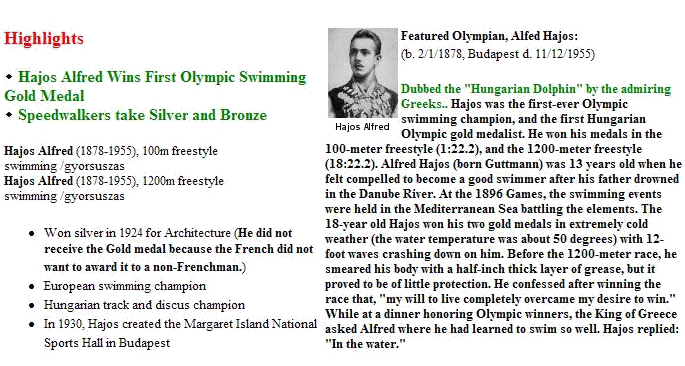|

Map of Europe
Map of Hungary
Map of Budapest

Hungary, facts in brief
Hungary, history in brief
Budapest, facts and history in brief
Copyright (c), All Rights Reserved.
All credit and inquiries to

When Nobel Laureate Enrico Fermi was asked if he believed
in extraterrestrials, he replied,
"They are already here...they are called Hungarians!"
Despite its being torn apart after WWI and losing half her total
population and 2/3 of her territory, Hungary ranks 8th in the
world in medals - this does not include the Hungarians that won
medals as nationals of other countries after borders were
artificially redrawn.
The beginnings of the Olympic Movement in Hungary go back further
than the Games in Athens.
Ferenc Kemeny, a great pacifist and member of the International
Peace Bureau, was one of Pierre de Coubertin's first kindred spirits,
with whom he struck up a friendship in the 1880's.
He took an active part in the Congress for the re-establishment of
the Games held in Paris in 1894 and was one of the founder members
of the IOC.
Thanks to the Hungarian Olympic Committee and the International
Olympic Committee for many of the pictures here.
1896, Athens
1900 Paris
1904 St. Louis
|
Highlights
-
Swimmer Halmay Zoltan wins 2
Golds!
-
Swimmer
Kiss Geza takes Silver and Bronze
Halmay Jeno Zoltan
(1881-1956),
Swimming: 50 yard freestyle swimming 1st
Gold
Halmay Jeno Zoltan (1881-1956),
Swimming: 100 yard freestyle
swimming 2nd Gold
See (in Hungarian) |
 Featured
Olympian, Halmay Jeno Zoltan: Featured
Olympian, Halmay Jeno Zoltan:
(b. 6/18/1881, Nagymagasfalu, Northern Hungary - d.
5/20/1956, Budapest)
Winner of 9 Olympic Medals!
Though he was born in Northern Hungary 125 years
before it was taken from Hungary and the area became known
as "Czechoslovakia" and then "Slovakia,"
the Slovaks try to claim him and
call him Imrich Zoltán Halmaj. Do not be fooled.
Halmay competed in three consecutive
Olympics and medaled in each one. His swimming prowess
earned him -
-
3 Medals in 1900: 2 Silver (220yd, 4000m freestyle), 1
Bronze (1000m freestyle)
- 2 Medals in 1904: 2 Gold (50 yard
freestyle, 100 yard freestyle)
- 2 Medals in 1906: 1 Gold (4x250m freestyle
relay), 1 Silver (100m freestyle); and
- 2 more Medals in 1908: 2
Silver (100m
freestyle; 4x200m freestyle relay).
|
1906 Athens
|
Highlights -
Swimmer Halmay Zoltan wins Third Gold!
Gold Medalists:
Gyorgy Sztantics, Speed Walking: 3000m
Men's Team Hungary - Swimming: 4x250m freestyle
Jozsef Onody,
Henrik Hajos,
Geza Kiss,
Zoltan Halmay 3rd Gold
|
 After
disappointing receptions in Paris and St. Louis, the
Olympic movement returned to Athens for the "Intercalated"
Games of 1906.
The mutual desire of Greece and Baron de Coubertin to recapture
the spirit of the 1896 Games led to an understanding that the
Greeks would host an interim games every four years between
Olympics. Nearly 900 athletes from 20 countries came to Athens,
including, for the first time, an official American team picked
by the USOC. The enthusiasm for these Games was great and the
Games seemed to regain their popularity. After
disappointing receptions in Paris and St. Louis, the
Olympic movement returned to Athens for the "Intercalated"
Games of 1906.
The mutual desire of Greece and Baron de Coubertin to recapture
the spirit of the 1896 Games led to an understanding that the
Greeks would host an interim games every four years between
Olympics. Nearly 900 athletes from 20 countries came to Athens,
including, for the first time, an official American team picked
by the USOC. The enthusiasm for these Games was great and the
Games seemed to regain their popularity.
Unfortunately,
because of political unrest in Greece around 1910, the
intercalated Games were cancelled for that year and never
continued. Medals won are
considered unofficial by the IOC.
|
1908 London
Highlights
-
Men's Team Fencing begins historic streak of Gold
through 14 CONSECUTIVE Olympics!
- Fencing Legend Fuchs Jeno
wins first 2 out of4 Golds
- Halmay wins 10th Medal
and Men's Swimming Team take Silver
Gold Medalists:
Dr. Fuchs Jeno (1882-1955),
Fencing/kardvivas 1st
Gold
Weisz Richard (1879-1945), heavyweight
wrestling/birkozas nehezsuly
Men's Team Hungary - Fencing/kardvivas:
1st Gold
Dr. Foldes Dezso
(1880-1950), 1st
Gold
Dr. Fuchs Jeno, (1882-1955)
2nd Gold
Dr. Gerde Oszkar (1883-1944),
1st Gold
Dr. Toth Peter (1882-1967),
1st Gold
Werkner Lajos (1883-1943)
1st Gold
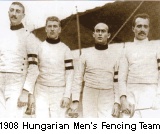
|
 Featured Olympian, Fuchs Jeno: Featured Olympian, Fuchs Jeno:
(b. October 29, 1882 - d. March 14, 1955)
One of the greatest fencers in Olympic history...
Fuchs competed in only two Olympiads for Hungary, but won
every competition he entered.
At the 1908 London Games, had only one touch against him
in the finals. In the team competition, Fuchs then led the
Hungarians to the gold medal with victories over Germany (9-0),
Italy(11-5), and Bohemia (9-7).
 Featured Olympian, Weisz Richard:
Featured Olympian, Weisz Richard:
(b. 1879, d. 1945)
Champion Weightlifter, Wrestling Gold...
An enormous man who weighed 209 pounds and possessed a
20-inch neck and a 50-inch chest, Weisz competed as a
heavyweight in Greco-Roman wrestling at the 1908 London
Olympics. In his first match, he almost pinned his Danish
opponent in the first minute and eventually won in a
little over 13 minutes. After defeating another Dane in
the second round, Weisz became Hungary's first Olympic
wrestling champion by defeating Aleksandr Petrov of Russia
in the gold medal match.
Weisz, who began wrestling at the age of 20, was also a
marvelous weightlifter. Besides his Olympic medal in
wrestling, Richard was the Hungarian National heavyweight
wrestling champion, Austria's first national weightlifting
champion, and was also Hungary's National heavyweight
weightlifting champion from 1903-1909.
|
1912, Stokholm
|
Highlights
- Fencing Legend Dr. Fuchs Jeno wins his third
and fourth Golds! Teammates Bekessy Bela and Meszaros Ervin take
Silver and Bronze
- Werkner Lajos, Toth Peter, Foldes Dezso, and
Gerde Oszkar win 2nd Gold!
Dr. Fuchs Jeno (1882-1955),
Fencing/kardvivas 3rd
Gold
Prokopp Sandor (1887-1964), Shooting/loveszet hadipuska csapat
Men's Team Hungary
- Fencing/kardvivas: 2nd Gold
Berty Laszlo (1875-1952),
Foldes Dezso (1880-1950), 2nd Gold
Dr. Fuchs Jeno (1882-1955), 4th Gold!
Gerde Oszkar (1883-1944), 2nd Gold
Meszaros Ervin (1877-1940),
Schenker Zoltan (1880-1966)
Dr. Toth Peter (1882-1967), 2nd Gold
Werkner Lajos (1883-1943),
2nd Gold
See
all 1912 medalists (in Hungarian) |
 Featured
Olympian, Fuchs Jeno: Featured
Olympian, Fuchs Jeno:
(b. October 29, 1882 - d. March 14, 1955)
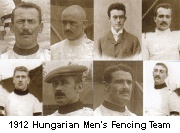 Fuchs returns...
Fuchs returns...
The legendary fencer Fuchs returned to the Olympics in 1912 at the
Stockholm Games and was absolutely brilliant.
He went through both
the individual and team competitions undefeated as he captured two
more gold medals. In 25 matches in individual
 competition during his Olympic career, Dr. Fuchs had an amazing
record of 22 wins, 2 losses, and 1 draw. Fuchs and the Men's Team
took gold again.
competition during his Olympic career, Dr. Fuchs had an amazing
record of 22 wins, 2 losses, and 1 draw. Fuchs and the Men's Team
took gold again.
Sandor Prokopp was one of the big
surprises of the Olympics taking gold in shooting.
|
1920, Antwerp: a Year of Shame
1920, Antwerp
A defeated Hungary was not allowed to participate
due to the aftermath of WWI. After the US left the "negotiations"
in disgust, the victors split Hungary into pieces at
Trianon
where Hungary lost two-thirds of her territory and 1/3
of her Hungarian-speaking population. See map and link.
|
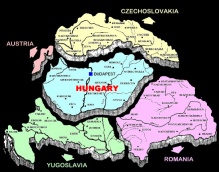 The
Tragedy at Trianon The
Tragedy at Trianon
The United States did not support these new
borders and left the "negotiations" in disgust,
leaving the French to prevail and reward their allies
who switched sides a week before the end of the war.
Despite promises and treaties, Hungarians today face cultural
genocide as termed by the Helsinki Watch Committee.
Czechoslovakia and its Benes Decrees expelled hundreds of
thousands of Hungarians and confiscated their property.
Today Hungarians in Rumania are still fighting to get
their properties back and preserve their culture and
language. Ethnic cleansing by Milosevic was very
successful too. Read more about
The Tragedy at Trianon. |
1924, Paris
|
Highlights
- A
dismembered Hungary returns to the Olympics and takes 2 Gold!
- Swimming Legend, Zoltan Halmay,
takes Silver in Architecture after French objection to his deserving
Gold
- Fencers take Silver and Bronze
Gold Medalists:
Dr. Halasy Gyula
(1891-1970) Skeet Shooting/loveszet agyaggalamb
Dr. Posta Sandor (1888-1952) Fencing/kardvivas
See
all 1924 medalists (in Hungarian) |


Hungary slowly
recovers...
Though Halasy and Posta overcame much adversity,
the disaster of WWI
is seen in this sub-par
showing. It wasn't until 1928 that Hungary was able to regain its
Olympic prowess. |
1928, Amsterdam
|
Highlights
-
Fencer Tersztyansky Odon wins Two Golds!
-
Teammate Attila Petschauer takes Silver and Gold!
Gold Medalists:
Keresztes Lajos (1900-1978) Lightweight Wrestling/kotottfogasu birkozas konnyusuly
Kocsis Antal (1905- ) Boxing/okolvivas legsuly
Dr. Mezo Ferenc (1885-1961) Epic
Novel / Muveszeti Verseny Irodalom Epika (no longer awarded)
Tersztyanszky Odon (1890-1929) Fencing/kardvivas,
1st Gold defeating teammate Attila Petschauer!
Men's Team Hungary - Fencing/Kardvivas:
3rd Gold
Garay Janos
(1889-1945),
Glykais Gyula (1893-1948)
Dr. Gombos Sandor (1895-1968),
Petschauer Atilla
(1904-1943), 1st Gold
Rady Jozsef (1884-1957),
Tersztyanszky Odon
(1890-1929), 2nd Gold
See all 1928 medalists
(in Hungarian) |




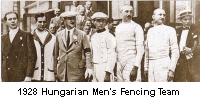
Click for larger images
|
1932, Los Angeles
|
Highlights
- Legendary Fencer Gerevich Aladar
wins first of his RECORD 7 GOLD MEDALS!
-
Petschauer Attila wins 2nd consecutive
Gold
-
Pelle Istvan takes 2 Golds and
2 Silvers!
-
Piller Gyorgy wins 2 Golds
- Men's Team Waterpolo begins Olympic
Domination toward 7 Total Golds!
-
Future Wrestling Gold Medalist,
Karpati Karoly, wins Silver
-
Future Wrestling Gold Medalist,
Zombori Odon, wins 2 Silvers
Gold Medalists:
Enekes Istvan (1911-1940),
Box/okolvivas legsuly
Pelle Istvan (1895-1968), Floor Exercises /
muszabadgyakorlat lolenges
Pelle Istvan (1895-1968), Pommelled Horse / lolenges
Piller Gyorgy (1889-1960), Fencing/kardvivas 1st
Gold
Men's Team Hungary - Fencing/Kardvivas:
4th Gold
Gerevich Aladar (1910-),
1st Gold of 6!
Glykais Gyula (1893-1948),
Kabos Endre (1906-1944),
1st Gold
(also took bronze in the individual sabre)
Nagy Erno
(1898-1977),
Petschauer Atilla (1904-1943),
2nd Gold
Piller Gyorgy
(1899-1960) 2nd Gold
Men's Team Hungary - Water Polo/Vizilabdazas: 1st Gold
Barta Istvan (1895-1948),
Brody Gyorgy (1908-1967), 1st Gold
Halassy Oliver (1909-1946), 1st Gold
Homonnai Marton (1906-1969),
1st Gold
Dr. Ivady Sandor (1903-),
Keseru Alajos (1905-1965),
Keseru Ferenc (1903-1968),
Nemeth Janos (1906-), 1st Gold
Sarkany Miklos (1908- ), 1st Gold
Vertesy Jozsef (1901- )
See
all 1932 medalists (in Hungarian) |
 Featured Olympian, Gerevich Aladar:
Featured Olympian, Gerevich Aladar:
(b. Jaszbereny 3/16/1910, d.
5/14/1991)
Greatest of all
Olympic Fencers...
Aladar Gerevich is the greatest of all Olympic fencers. His six
successive gold medals in the sabre team event at every Games from
1932 to 1960 stands as a record for any Olympic sport.
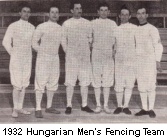 When told in 1960 that he was to old to compete for a place in the
Hungarian team, he challenged the entire team and defeated them all.
In the sabre, he won individual gold in 1948, silver in 1952, and
bronze in 1936, and a further bronze in the foil team event in 1952.
He confirmed his reputation as the world's greatest sabreur with three
individual titles at the World Championships (1935, 1951, 1955) and
he competed on nine winning
When told in 1960 that he was to old to compete for a place in the
Hungarian team, he challenged the entire team and defeated them all.
In the sabre, he won individual gold in 1948, silver in 1952, and
bronze in 1936, and a further bronze in the foil team event in 1952.
He confirmed his reputation as the world's greatest sabreur with three
individual titles at the World Championships (1935, 1951, 1955) and
he competed on nine winning  Hungarian sabre teams at the World Championships. In addition to his
1952 Olympic medal in team foil, he won the Hungarian national championship
with the foil seven times. His wife Erna Bogathy is part of three
generations of medal winners. Her father Albert Bogen (1882-1961)
was part of the Austrian Sabre team that won silver in 1912 (behind
Hungary), she won bronze (under the name Erna Bogen) in foil in 1932,
and their son Pal Gerevich (born during the Olympics in 1948) was
part of the silver winning
Hungarian sabre teams at the World Championships. In addition to his
1952 Olympic medal in team foil, he won the Hungarian national championship
with the foil seven times. His wife Erna Bogathy is part of three
generations of medal winners. Her father Albert Bogen (1882-1961)
was part of the Austrian Sabre team that won silver in 1912 (behind
Hungary), she won bronze (under the name Erna Bogen) in foil in 1932,
and their son Pal Gerevich (born during the Olympics in 1948) was
part of the silver winning
 Hungarian Sabre team of '72 and '80. Gerevich later coached
at the Vasa Sports Club in Budapest.
Hungarian Sabre team of '72 and '80. Gerevich later coached
at the Vasa Sports Club in Budapest.
Read more at International
Olympic Committee Heroes and see photos and more
information..
Teammates, Fencers Piller Gyorgy,
won 2 golds, while Kabos Endre wins Gold and
Bronze.

 Enekes
Istvan wins boxing Gold and Gymnast Pelle Istvan wins 2
Golds. The Waterpolo Team begins Hungary's Olympic 7-time Championship
legacy with their first Gold. Enekes
Istvan wins boxing Gold and Gymnast Pelle Istvan wins 2
Golds. The Waterpolo Team begins Hungary's Olympic 7-time Championship
legacy with their first Gold.
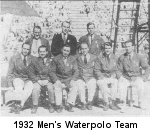
Click for larger images
|
1936, Berlin
|
Highlights
- The now tiny Hungary finishes
third in overall Gold!
- Kabos Endre wins 2nd and 3rd
Gold Medals and a bronze!
- Kovacs Pal wins first of 6
Gold Medals!
- Amputee Waterpoloist Halassy
Oliver wins 2nd Gold!
Gold Medalists:
Csik Ferenc (1913-1945), 100m
freestyle (also won bronze in the 4x200m freestyle relay)
Elek Ilona
(1907-)Fencing 1st Gold
Harangi Imre (1913-1979), Boxing, Lightweight
Kabos Endre (1906-1944), Fencing 2nd
Gold
Kadarne Csak Ibolya (1915-), Highjump
Karpati Karoly (1906-), Wrestling: Lightweight
Lorincz Marton (1911-1969), Wrestling: bantamweight
Zombori Odon (1906-), Wrestling
Men's
Team Hungary - Fencing/kardvivas:
5th Gold
Berczelly Tibor (1912-),
1st Gold
Gerevich (Gerei) Aladar (1910-),
2nd Gold of 6!
Kabos Endre (1906-1944), 3rd Gold
Kovacs Pal (1912-), 1st Gold
Dr. Rajczy Imre (1911-1978),
Rajcsanyi Laszlo (1907-) 1st Gold
Men's Team Hungary - Waterpolo/Vizilabda: 2nd Gold
Brandy Jeno (1913-1980),
Brody Gyorgy (1908-1967), 2nd Gold
Bozsi Mihaly (1911-),
Halassy Oliver (1909-1946),
2nd Gold
Hazai Kalman (1913-),
Hommonai Marton (1905-1969), 2nd Gold
Kutasy Gyorgy (1910-1977),
Molnar Istvan (1913-),
Nemeth Janos (1906-), 2nd Gold
Sarkany Miklos (1908-), 2nd Gold
Tarics Sandor (1913-)




Click for larger images
See
all 1936 medalists (in Hungarian) |
The 1936
Berlin Olympics...
are best remembered for Adolf
Hitler’s failed attempt to use them to prove his
theories of Aryan racial superiority. As it turned out,
the most popular hero of the Games, even among the German
people, was the legendary African-American sprinter and long jumper
Jesse Owens... A Hungarian
Amputee added to the insult by winning Gold!
 Featured Olympian, Csik Ferenc:
Featured Olympian, Csik Ferenc:
(b. Kaposvár 12/12/1913, d. Sopron, 1945)
Gave His Life
Helping Others...
This International Swimming Hall of
Famer took 1936 gold (100m freestyle) and bronze (800m
freestyle relay). He set 3 World Records (relays), 6
European Records (100m freestyle, 400m, 800m freestyle
relays) and 13 Hungarian Records (100m, 200m freestyle,
100m, 200m breaststroke; relays); won 4 European
Championships (100m freestyle; freestyle relays);
and 17 Hungarian Championships(100m, 200m freestyle; 100m,
200m breaststroke; 300m individual medley; 400m, 800m
freestyle relays). A medical doctor, he died at the age of
32 in Sopron in an allied bombing raid while he was
tending patients..
 Featured Olympian, Kabos Endre:
Featured Olympian, Kabos Endre:
(b. November 5, 1906 - d. November 4, 1944)
One of the World's
Greatest Fencers Returns...
Kabos began fencing after receiving a fencing outfit as a
birthday present. Although he hid the outfit in his
wardrobe, a friend found it and teased
him. He enrolled in a fencing club to spite his
friend the following day and went on to compete in
two Olympiads for the H
 ungarian fencing team in the 1930s.
A sabre specialist, he won four medals (three
gold) during his Olympic career. At the 1932 Los Angeles
Games, he won a gold medal in the team competition;
Hungary defeated the United States
(13-3), Italy (9-2), and Poland (9-1) in the finals.
Kabos also medaled in the individual competition
as he won five of nine matches to the
win the bronze (he tied with Erwin Casmir of Germany
for third but Kabos was awarded the medal because
he received fewer touches in the finals).
Kabos also won the individual sabre at the 1933
and 1934 World Championships
ungarian fencing team in the 1930s.
A sabre specialist, he won four medals (three
gold) during his Olympic career. At the 1932 Los Angeles
Games, he won a gold medal in the team competition;
Hungary defeated the United States
(13-3), Italy (9-2), and Poland (9-1) in the finals.
Kabos also medaled in the individual competition
as he won five of nine matches to the
win the bronze (he tied with Erwin Casmir of Germany
for third but Kabos was awarded the medal because
he received fewer touches in the finals).
Kabos also won the individual sabre at the 1933
and 1934 World Championships
Kabos returned to the Olympics
four years later at the
1936 Berlin Olympics and dominated the competition.
He won gold medals in both the
team and individual events,
winning 24 of 25 matches in the individual competition,
while Hungary as a team went undefeated.
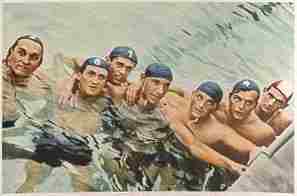 Featured
Olympian, Halassy Oliver:
Featured
Olympian, Halassy Oliver:
(b. 1909 - d. 1946)
A Lesson in
Tenacity: Amputee Wins Gold!
The International Swimming Hall of Famer and Water Poloist Oliver Halassy won his 2nd
Gold Medal despite the fact that one of his legs had been
amputated below the knee following a streetcar accident.
He also won 1928 silver and 1932 gold; European
Championships: Gold (1500m freestyle); and 25 Hungarian
Individual Swimming Titles (400m to 1500m freestyle).
|
1948, London
|
Highlights
- Legendary Boxer
Laszlo Papp wins first of his historic 3 Consecutive Golds!
- Fencer Elek Ilona wins 2nd Consecutive
Gold Medals!
Men's Swimming Team take Silver
- Deszo Gyarmati and Men's Waterpolo
Team take Silver
Gold Medalists:
Bobis Gyula (1909-1972),
Wrestling: Heavyweight
Csik Tibor (1927-1976), Boxing
Elek Ilona (1907-),Fencing
2nd Gold
Gyarmati Olga (1924-), Long jump
Nemeth Imre (1917-), Hammerthrow (World Record) His son would win Gold in 1976!
Papp Laszlo (1926-), Boxing, Middleweight 1st
of 3!
Torma Gyula (Július)
(1923-1991), Boxing: Welterweight
- (Competing
for Slovakia)
Pataki Ferenc (1917-),Gymnastics Floor Exercise/muszabadgyakorlat
Takacs Karoly (1910-1976), Shooting:
25m rapid fire pistol/loveszet otalakos gyorspisztoly
1st Gold
Men's Team Hungary
- Fencing/Kardvivas:
6th Gold
Bercelly Tibor (1912-),
2nd Gold
Gerevich Aladar (1910-),
3rd Gold!
Karpati Rudolf (1920-),
1st Gold
Kovacs Pal (1912-),
2nd Gold!
Papp Bertalan (1913-),
1st Gold
Rajcsanyi Laszlo (1907-)
2nd Gold
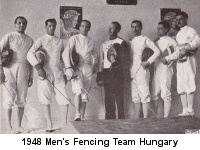







Click for larger images
See all
1948 medalists (in Hungarian) |
 Featured
Olympian, Laszlo Papp:
Featured
Olympian, Laszlo Papp:
(b. 3/25/1926 Budapest)
A Tragic
Champion...
After winning the Olympic middleweight title in 1948
Hungary's László Papp won the light-middleweight crown
in 1952 and 1956 to become the first boxer to win three
Olympic gold medals (only great Teofilo Stevenson of Cuba
could later match this feat). He also won European amateur titles in
1949 and 1951. Possibly his finest victory in the Olympic
ring came in the 1956 final when he beat José Torres
(USA), a future world professional champion. A skillful,
hard-punching southpaw, Papp was the first fighter from
the Soviet bloc allowed to turn professional and he won
the European middleweight title in 1962. He would
eventually amass 6 European Middleweight Titles
(1962-1965). However, in 1965, the Hungarian authorities
withdrew their permission for him to fight professionally
and the chance of a world title bout was denied him. Papp
later served as the coach of the Hungarian national boxing
team from 1971-92.
- See the International Olympic
Committee's
Olympic
Heroes for additional photos and bio or The Hungary
Page's own Famous
Sports Hungarians
section.
 Featured Olympian, Takacs Karoly:
Featured Olympian, Takacs Karoly:
(b. Budapest, 1/21/1910,
d. 1/5/1976)
The
Right-Handed Shooter Who Won With His Left Hand...
Karoly Takacs was a member of the Hungarian pistol
shooting team in 1938 when, while serving as a sergeant in
the army, a defective grenade exploded in his right
hand - his pistol hand - and shattered it completely.
After spending a month in the hospital, Takacs
secretly taught himself to shoot with his left hand.
The following year he won the Hungarian pistol shooting
championship and was a member of the Hungarian team that
won the automatic pistol event at the world championships.
The next two Olympics, in 1940 and 1944, were cancelled
because of war, but in 1948 Takacs qualified for the
Hungarian Olympic team in the rapid-fire pistol event. He
was 38 years old. Before the competition, the favorite,
world champion and world record holder, Carlos Enrique Díaz
Saenz Valiente, asked Takacs why he was in London. Takacs
replied, "I'm here to learn." Takacs won the
gold medal and beat the world record by ten points. During
the medal ceremony, Díaz Saenz Valiente, who finished
second, turned to Takacs and said, "You have learned
enough." Four years later in Helsinki, Takács
successfully defended his Olympic title to become the
first repeat winner of the rapid-fire pistol event.
- See
the International Olympic Committee's
Olympic
Heroes for additional photos and bio or read more
about
Olympic Shooting.
|
1952, Helsinki
|
Highlights
-
The Legendary Soccer "Golden
Team" makes its mark!
-
The Great Laszlo Papp wins Boxing
Gold again!
-
"Disabled" Shooter
Takacs Karoly wins 2nd Consecutive Gold becoming
first repeat winner
of the rapid-fire pistol event;
teammate Szilárd Jun, takes Silver!
- Fencer Elek Ilona also takes
Silver!
Gold Medalists:
Csermak Jozsef (1932-), Hammerthrow (broke the
world record of 59.88m set by fellow Hungarian Gold Medalist Imre Nemeth
two years earlier)
Gyenge Valeria (1933-), 400m Freestyle Swimming
Hodos Imre, Wrestling
Keleti Agnes (1921-), Floor Exercise
Korondi Margit (1932-), Gymnastics - Uneven Bars
Kovacs Pal (1912-), Fencing
3rd Gold!
Papp Laszlo (1926-), Boxing 2nd
Gold!
Szekely (Gyarmati) Eva (1927-), 200m Breaststroke
Szilvasy Miklos (1925-1969), Wrestling
Szoke Katalin (1935-),100m Freestyle swim
Takacs Karoly (1910-1976), Shooting: 25m rapid fire pistol
2nd
Gold!
Men's Team Hungary
- Fencing/Kardvivas: 7th Gold
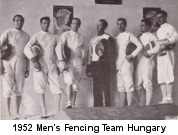 Bercelly Tibor (1912-), 3rd Gold!
Bercelly Tibor (1912-), 3rd Gold!
Gerevich Aladar (1910-), 4th Gold!
Karpati Rudolf (1920-), 2nd Gold
Kovacs Pal (1912-), 4th Gold
Papp Bertalan (1913-), 2nd Gold
Rajcsanyi Laszlo (1907-),
3rd Gold!
Men's Team Hungary
- Soccer/labdarugas: 1st Gold
THE LEGENDS! "The Golden Team"/Az Arany
Csapat! "The Magnificent Magyars"
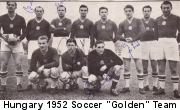 Bozsik Jozsef (1925-1978),
Bozsik Jozsef (1925-1978),
Budai Laszlo (1928-),
Buzanszky Jeno (1925-),
Czibor Zoltan (1929-),
Csordas Lajos (1932-1968),
Dalnoki Jeno (1932-),
Grosics Gyula (1926-),
Hidegkuti Nandor (1922-),
Kocsis Sandor(1929-1979),
Kovacs Imre (1921-),
Lantos Mihaly (1928-),
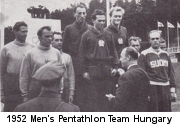 Lorant Gyula (1923-1981),
Lorant Gyula (1923-1981),
Palotas Peter (1929-1967),
Puskas Ferenc (1927-),
Zakarias Jozsef (1924-1971)
Men's Team Hungary
- Modern Pentathlon 1st Gold
Benedek Gabor (1927-),
Kovacsi Aladar (1932-),
Szondy Istvan (1925-)
Women's Team Hungary - 4X100m
Relays/gyorsvalto:
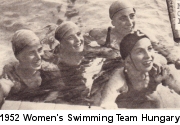 Novak Ilonka (1925-),
Novak Ilonka (1925-),
Temes Judit (1930-),
Novak Eva (1930-),
Szoke Katalin (1935-),
Littomeritzky Maria (1927-)
Men's Team Hungary
- Water Polo/Vizilabda: 3rd Gold
Antal Robert (1921-),
Bolvari Antal (1932-), 1st Gold!
Fabian Dezso (1918-1973),
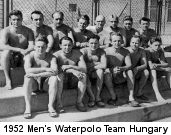 Gyarmati Dezso (1927-),
1st Gold!
Gyarmati Dezso (1927-),
1st Gold!
Hasznos Istvan (1924-),
Jeney Laszlo (1923-), 1st Gold!
Karpati Gyorgy (1935-), 1st Gold!
Lemhenyi Dezso (1917-),
Markovits Kalman (1931-), 1st Gold!
Marlim Miklos (1931-),
Szittya Karoly (1918-),
Szivos Istvan (1920-), 1st Gold!
Vizvari Gyorgy (1928-)
See
all 1952 medalists (in Hungarian)
|
 Featured Olympian, Puskas Ferenc:
Featured Olympian, Puskas Ferenc:
(b. 4/2/1927 Budapest, d. )
The "Greatest
Soccer Player in History"...
"He
played 84 times and scored a world record 83 goals! No player, not even
Pelé, has scored that many goals for a national team."
The"Little Cannon," the "Galloping Major,"
or the "Left-Foot Magician."Whichever nickname you remember him by,
he exemplified the role of a striker and shoting. His dreadful
left-feet shoot frightened many goalkeepers. It was Puskas who
bruised the chest of Korean soccer player Deok-young Hong, the
Goal Keeper of the Korean Team during the 1954 World Cup Soccer Games.
Puskas began his career with Honved, which in the years following
World War Two was the Hungarian army team. Earning an enduring
reputation for his deadly left foot, he won an Olympic gold medal
with the national side in 1952. Led by Puskas, Hungary recorded
one of the most famous victories in soccer history in 1953 when
they became the first continental team to beat England at Wembley,
winning 6-3 in magnificent style. 6 months later,despite German
attempts to injure him in an earlier match, Puskás led Hungary
with its incredible 4-year, 33 game winning streak to defeat
powerhouse England 7-1 and into the 1954 World Cup finals where
favored. Hungary lost to Germany after a controversial call
taking away a clear Hungarian goal.
The "Golden Team
"disintegrated after the 1956 uprising against communist rule
in Hungary was brutally put down by Soviet troops.
Puskas, on tour at the time with Honved, did not return home
and instead joined Real Madrid, where he formed his great
partnership with Di Stefano. Puskas won three European Cups,
six Spanish championships and two Spanish Cups with Real.
Puskás later became head coach for team Greece.
Read more on our own Sports page.
 Featured Olympian, Szekely (Gyarmati) Eva:
Featured Olympian, Szekely (Gyarmati) Eva:
(b. 4/3/1927 Budapest, d. )
One of the greatest Olympic Swimmers...
Szekely competed in three Olympiads for Hungary. At the 1948
Games, Szekely finished fourth in the 200-meter breaststroke,
fifth in the 4x100-meter freestyle, and sixth in the
400-meter freestyle. She returned to the Olympics four
years later at the 1952 Helsinki Games, competed in two
events, and won her first Olympic medal. In the 200-meter
breaststroke, Szekely won her preliminary heat and then
set an Olympic record in the semifinals. In the final,
Eva won the gold medal and lowered her Olympic record again.
 Szekely's final Olympic Games occured in 1956, when she and her husband, Dezso Gyarmati (Hungary's water polo captain and "Greatest Waterpoloist of All Time") left for the Melbourne
Olympics during the first days of the Hungarian revolt against Communism.
Eva later explained that the world turned upside down when: "...we
arrived in Melbourne, we learned that the Russians had come into power...we
had no word of our two-year old daughter, or my parents. I didn't
get any real sleep for a week before I was due to race and lost over
12 pounds. My husband also was extremely worried, of course..."
At the Games, Eva won the silver in the 200-meter breaststroke (2:54.8).
She said of her silver medal: "...even though it was one of the
few times that I have been beaten in competition, considering everything,
I am very proud of the silver medal..."
Szekely's final Olympic Games occured in 1956, when she and her husband, Dezso Gyarmati (Hungary's water polo captain and "Greatest Waterpoloist of All Time") left for the Melbourne
Olympics during the first days of the Hungarian revolt against Communism.
Eva later explained that the world turned upside down when: "...we
arrived in Melbourne, we learned that the Russians had come into power...we
had no word of our two-year old daughter, or my parents. I didn't
get any real sleep for a week before I was due to race and lost over
12 pounds. My husband also was extremely worried, of course..."
At the Games, Eva won the silver in the 200-meter breaststroke (2:54.8).
She said of her silver medal: "...even though it was one of the
few times that I have been beaten in competition, considering everything,
I am very proud of the silver medal..."
Between 1940-1958, Szekely set 10 World
records and 5 Olympic swimming records. Her World Records
included the 100-meter breaststroke (1:16.9) in 1951, the
400-meter individual medley (5:50.4) in 1953, and the
400-meter freestyle relay (4:27.2) in 1952. Eva also won
10 World University Championships, 68 Hungarian National
Titles, and held 107 Hungarian National records! In 1952,
the definition of breaststroke was such that the arms had
to move in parallel. Szekely was the first to use the
butterfly stroke when she won the gold at Helsinki. By
1956, the definition had changed and the butterfly was a
medal discipline of its own.
Trivia:
- In 1957, Dezso was beaten and left for dead when
the communist puppet regime heard about the family's intention of
defecting. He survived and took Eva and daughter Andrea with forged
passports and fled Hungary to the United States. They returned to
Hungary the following year because they were concerned about Eva's
parents (who remained in Hungary). Dezso continued to compete for
the national water polo team. Andrea Gyarmati, was a 1972
Olympic silver medalist in the 100m backstroke bronze medalist in
the 100-meter butterfly. She later married Mihaly Hesz,
the 1968 Olympic canoeing champion.
|
1956, Melbourne
Highlights
-
Revolution in Hungary! Russians
Invade...
-
"Blood in the Water - legendary Hungary vs. Russia Waterpolo
match
- Hungary finishes fourth in overall
Gold!
-
Gymnast Keleti Agnes Wins 4
Gold Medals: Three Individual one as member of Team Hungary!
- Boxing Legend
Papp Laszlo wins Third Consecutive
Gold Medal - First Boxer to Win Three!
Gold Medalists:
Karpati Rudolf (1920-),
Fencing/kardvivas 3rd Gold!
Keleti Agnes (1921-), Uneven Bars/felemaskorlat,
1st
Gold
Keleti Agnes (1921-), Beam/gerenda,
2nd Gold
Keleti Agnes (1921-),
Floor Exercise/muszabadgyakorlat
3rd Gold!
Papp Laszlo (1926-), Boxing/okolvivas nagyvaltosuly -
3rd
Consecutive Gold Medal!
Men's Team Hungary - 1000m Kayak
Uranyi Janos (1924-1964),
Fabian Laszlo (1936-)
Men's Team Hungary -
Fencing 8th Gold
Gerevich Aladar (1910-), 5th
Gold!
Hamori Jeno (1933-),
Karpati Rudolf (1920-), 4th Gold!
Keresztes Atilla (1928-),
Kovacs Pal (1912-), 5th Gold!
Magay Daniel (1932-)
Women's Team Hungary - Rythmic
Gymnastics
Koteles Erzsebet (1924-),
Keleti Agnes (1921-) 4th Gold!
Kertesz Aliz (1935-),
Tass Olga (1929-),
Bodo Andrea (1934-),
Korondi Margit (1932-)
Men's Team Hungary - Water
Polo 4th Gold
Bolvari Antal (1932-),
2nd Gold!
Boros Otto (1929-), 1st Gold!
Gyarmati Dezso (1927-) 2nd Gold!
Hevesi Istvan (1931-), 2nd Gold!
Jenei Laszlo (1923-), 2nd Gold!
Kanizsa Tivadar (1933-1975), 1st Gold!
Karpati Gyorgy (1935-), 2nd Gold!
Markovits Kalman (1931-), 2nd Gold!
Mayer Mihaly (1933-), 1st Gold!
Szivos Istvan (1920-), 2nd Gold!
Zador Ervin (1935-)



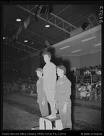
See all
1956 medalists (in Hungarian)
|


 Revolution in Hungary! Flag of the New
Republic Flies Over Melbourne!
Revolution in Hungary! Flag of the New
Republic Flies Over Melbourne!
The 1956 Olympics was bittersweet indeed. After a
successful revolution and a few weeks of freedom. the
Soviets kidnapped the premier and general under a white
flag and invaded Hungary. When officials raised
the communist-Hungarian flag, the Olympic Village received
numerous calls objecting to it not being the
Kossuth Arms flag adopted during the Hungarian uprising.
The flag was
vandalized one night, with the red star of communism being removed from
the center and replaced by the Kossuth Arms with a mark of mourning.
When the Village staff requested clarification from the newly formed,
free Federal government, they were informed that the Kossuth
Arms flag was being flown in Budapest and therefore was the
correct flag.
Blood in the Water: Hungary vs.
The Soviet Union...
 Amid
all the tension caused by the Soviet invasion of Hungary, Hungary
and the Soviet Union met in a water polo match, one of the most famous
water polo matches in history.
The game was played in a packed stadium with many Hungarian-born Australians
in the crowd. In addition to the political tension it was also a crucial
game in terms of the water polo competition. If Hungary were to win
it would almost be assured of the gold medal.
Amid
all the tension caused by the Soviet invasion of Hungary, Hungary
and the Soviet Union met in a water polo match, one of the most famous
water polo matches in history.
The game was played in a packed stadium with many Hungarian-born Australians
in the crowd. In addition to the political tension it was also a crucial
game in terms of the water polo competition. If Hungary were to win
it would almost be assured of the gold medal.
 The match was rough from the beginning but became increasingly violent
after Hungary took a 4-0 lead in the second half. At one point a Hungarian
player, Ervin Zador, was heavily knocked by a Soviet
player and emerged from the pool with serious facial bleeding. The
crowd became enraged and police were called to prevent a riot. The
match was abandoned shortly before full time and Hungary was credited
with a victory. This ultimately secured it the gold medal after the
completion of other matches.
The match was rough from the beginning but became increasingly violent
after Hungary took a 4-0 lead in the second half. At one point a Hungarian
player, Ervin Zador, was heavily knocked by a Soviet
player and emerged from the pool with serious facial bleeding. The
crowd became enraged and police were called to prevent a riot. The
match was abandoned shortly before full time and Hungary was credited
with a victory. This ultimately secured it the gold medal after the
completion of other matches.
Many of the Hungarian team were not able to return to their
homeland to rejoice in this victory, choosing instead to remain in
Australia or seek refuge in other countries rather than return to
their war-ravaged country. Read more here,
http://fog.ccsf.cc.ca.us/~sgati/gatiproductions/starting_over/revolution.htm or our on own 1956 page.
 Featured
Olympian, Deszo Gyarmati:
Featured
Olympian, Deszo Gyarmati:
(b. 10/23/1927 Miskolc, d. )
The Greatest Water
Polo Player of All-Time...
Deszo Gyarmati's feat of winning water polo medals at
five successive Olympic Games (gold 1952, 1956, 1964; silver 1948;
bronze 1960) has never been matched. He also captained winning
Hungarian teams at the 1954 and 1962 European Championships. An
excellent swimmer with a best time of 58.5 seconds for 100m (quite
fast in that era), Gyarmati was called the "world's fastest water
polo player." He was ambidextrous and could play either back or
forward. Gyarmati was considered a Hungarian national hero. He coached
the Hungarian team that won the Olympic title in 1976 and later became
a member of Parliament. see The International Olympic Committee's
Olympic Heroes
Trivia:
He married the 1952 Olympic 200m breaststroke
champion Eva Székely In 1957, when the post-revolution,
communist puppet government learned that Deszo and Eva
were planning to defect, four men dragged Deszo to an
abandoned building and beat him to a bloody pulp,
leaving him for dead. He survived, and they used
forged passports to flee the country with their
daughter, Andrea who would later become a world record
swimmer and Olympic Silver Medalist.
|
1960, Rome
Highlights
-
Fencing Legend Gerevich Aladar
wins RECORD 6th CONSECUTIVE GOLD!
- Fencing Great, Kovacs Pal, wins 7th Medal (6th
Gold)!
- Another Fencing Great, Karpati Rudolf, wins
6th Gold!
- Deszo Gyarmati wins an unprecendented 5th medal
at his fifth consecutive Olympics!
- Legendary High Jumper Iolanda Balas takes Gold!
(Competing for Rumania)
- Wrestler
Polyak Imre sets Olympic Record with 3rd consecutive Silver!
- Men's Soccer Team Hungary takes Bronze
Gold Medalists:
Karpati Rudolf (1920-),
Fencing 5th
Gold!
Nemeth Ferenc (1936-), Modern Pentathlon
Parti Janos (1932-), Canoe C1 1000m
Torok Gyula (1938-), Boxing
Iolanda Balas (1936-), High Jump
Men's
Team Hungary - Fencing/Kardvivas: 9th
Gold
Delneky Gabor (1932-),
Gerevich Aladar (1910-), RECORD
6th Consecutive Gold! Not matched until
Sydney 2000!
Horvath Zoltan (1937-),
Karpati Rudolf (1920-), 6th Gold!
Kovacs Pal (1912-), 6th Gold!
Mendelenyi Tamas (1936-)
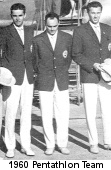 Men's
Team Hungary - Modern Pentathlon 2nd
Gold Men's
Team Hungary - Modern Pentathlon 2nd
Gold
Balczo Andras (1938-), 1st
Gold!
Nagy Imre (1933-),
Nemeth Ferenc (1936-)
See
all 1960 medalists (in Hungarian) |
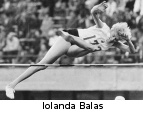 Featured
Olympian, Iolanda Balas: Featured
Olympian, Iolanda Balas:
(b. 12/12/1936 Transylvania, d. )
Dominated like no
other...
Iolanda Balas (Balazs) completely
dominated women's high jumping between 1957 and 1967. Balas,
a Rumanian citizen of Hungarian origin born in Transylvania
in 1936, was married to her coach and fellow high jumper Ion
Soeter (he died in 1987). She is now a leading international
official. Iolanda Balas occupies a special niche in athletics
history, a class apart. For a whole decade she went
unbeaten winning an incredible 140 consecutive competitions
and breaking the world records
14 times, mostly her own. Her 1961 record of 1.91 metres remained
unbeaten for ten years. She captured Olympic titles in 1960
and 1964 by huge margins, and such was her supremacy that at the
time she cleared 1.91m no other woman had gone higher than 1.78m.
Some of her luckless contemporaries complained that they had no
chance against her because she was so very tall (1.85m, or nearly
6ft 1in) with particularly long legs even for that height.
But that physical advantage was largely cancelled out by her inability
to master the more efficient straddle and western roll techniques of
the pre-Fosbury Flopera. She explained: "My style is quite obsolete
but it suits my body structure."
Read more at the
International
Association of Athletics Federations
or at the International Olympic Committee's Olympic
Heroes
 Featured
Olympian, Kovacs Pal: Featured
Olympian, Kovacs Pal:
(b. 12/12/1936 Transylvania (annexed by Rumania), d. )
Winner of 7 Olympic Medals!
Member of the Hungarian Sabre team that won gold at Berlin, London,
Helsinki, Melbourne and Rome. He also won individual gold in '52, bronze
in '48. He was World Sabre champion in 1937 and 1953. He later became
president of the Hungarian Fencing Federation.





Click for larger images
|
1964, Tokyo
N.B. All information from here on
are screenprint and links will not work.
I couldn't guarantee the previous ones either.

Site Index
Back to Top
Photos Index
Thanks for coming, I hope you have enjoyed it, will recommend
it to your friends, and will come
back later to see my site developing
and expanding.
I'm trying to make my pages
enjoyable and trouble free for everyone,
please let me know of any mistakes
or trouble with links, so I can
fix any problem as soon as possible.
These pages are best viewed with monitor
resolution set at 640x480 and kept simple
on purpose so everyone can enjoy them
across all media and platforms.
Thank you.
Webmaster

|

